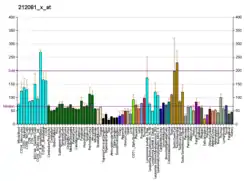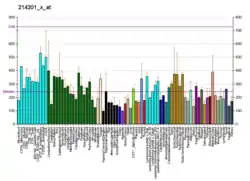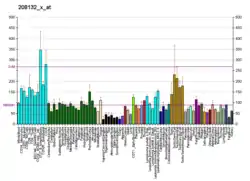BAT2
Large proline-rich protein BAT2 is a protein that in humans is encoded by the BAT2 gene.[5][6][7]
| PRRC2A | |||||||||||||||||||||||||
|---|---|---|---|---|---|---|---|---|---|---|---|---|---|---|---|---|---|---|---|---|---|---|---|---|---|
| Identifiers | |||||||||||||||||||||||||
| Aliases | PRRC2A, BAT2, D6S51, D6S51E, G2, proline rich coiled-coil 2A | ||||||||||||||||||||||||
| External IDs | OMIM: 142580 MGI: 1915467 HomoloGene: 10567 GeneCards: PRRC2A | ||||||||||||||||||||||||
| |||||||||||||||||||||||||
| |||||||||||||||||||||||||
| |||||||||||||||||||||||||
| |||||||||||||||||||||||||
| Orthologs | |||||||||||||||||||||||||
| Species | Human | Mouse | |||||||||||||||||||||||
| Entrez | |||||||||||||||||||||||||
| Ensembl |
| ||||||||||||||||||||||||
| UniProt | |||||||||||||||||||||||||
| RefSeq (mRNA) | |||||||||||||||||||||||||
| RefSeq (protein) | |||||||||||||||||||||||||
| Location (UCSC) | Chr 6: 31.62 – 31.64 Mb | Chr 17: 35.15 – 35.16 Mb | |||||||||||||||||||||||
| PubMed search | [3] | [4] | |||||||||||||||||||||||
| Wikidata | |||||||||||||||||||||||||
| |||||||||||||||||||||||||
Function
A cluster of genes, BAT1-BAT5, has been localized in the vicinity of the genes for TNF alpha and TNF beta. These genes are all within the human major histocompatibility complex class III region. This gene has microsatellite repeats which are associated with the age-at-onset of insulin-dependent diabetes mellitus (IDDM) and possibly thought to be involved with the inflammatory process of pancreatic beta-cell destruction during the development of IDDM. This gene is also a candidate gene for the development of rheumatoid arthritis. There are two alternatively spliced transcripts encoding different isoforms described for this gene.[7]
Interactions
BAT2 has been shown to interact with:
References
- ENSG00000206427, ENSG00000231825, ENSG00000231370, ENSG00000226618, ENSG00000225164, ENSG00000225748 GRCh38: Ensembl release 89: ENSG00000204469, ENSG00000206427, ENSG00000231825, ENSG00000231370, ENSG00000226618, ENSG00000225164, ENSG00000225748 - Ensembl, May 2017
- GRCm38: Ensembl release 89: ENSMUSG00000024393 - Ensembl, May 2017
- "Human PubMed Reference:". National Center for Biotechnology Information, U.S. National Library of Medicine.
- "Mouse PubMed Reference:". National Center for Biotechnology Information, U.S. National Library of Medicine.
- Banerji J, Sands J, Strominger JL, Spies T (Apr 1990). "A gene pair from the human major histocompatibility complex encodes large proline-rich proteins with multiple repeated motifs and a single ubiquitin-like domain". Proc Natl Acad Sci U S A. 87 (6): 2374–8. Bibcode:1990PNAS...87.2374B. doi:10.1073/pnas.87.6.2374. PMC 53689. PMID 2156268.
- Iris FJ, Bougueleret L, Prieur S, Caterina D, Primas G, Perrot V, Jurka J, Rodriguez-Tome P, Claverie JM, Dausset J, et al. (Jun 1993). "Dense Alu clustering and a potential new member of the NF kappa B family within a 90 kilobase HLA class III segment". Nat Genet. 3 (2): 137–45. doi:10.1038/ng0293-137. PMID 8499947. S2CID 33041319.
- "Entrez Gene: BAT2 HLA-B associated transcript 2".
- Lehner B, Semple JI, Brown SE, Counsell D, Campbell RD, Sanderson CM (Jan 2004). "Analysis of a high-throughput yeast two-hybrid system and its use to predict the function of intracellular proteins encoded within the human MHC class III region". Genomics. 83 (1): 153–67. doi:10.1016/S0888-7543(03)00235-0. PMID 14667819.
Further reading
- Spies T, Bresnahan M, Strominger JL (1989). "Human major histocompatibility complex contains a minimum of 19 genes between the complement cluster and HLA-B". Proc. Natl. Acad. Sci. U.S.A. 86 (22): 8955–8. Bibcode:1989PNAS...86.8955S. doi:10.1073/pnas.86.22.8955. PMC 298409. PMID 2813433.
- Bonaldo MF, Lennon G, Soares MB (1997). "Normalization and subtraction: two approaches to facilitate gene discovery". Genome Res. 6 (9): 791–806. doi:10.1101/gr.6.9.791. PMID 8889548.
- Singal DP, Li J, Zhu Y (2000). "HLA class III region and susceptibility to rheumatoid arthritis". Clin. Exp. Rheumatol. 18 (4): 485–91. PMID 10949724.
- Hashimoto M, Nakamura N, Obayashi H, et al. (2000). "Genetic contribution of the BAT2 gene microsatellite polymorphism to the age-at-onset of insulin-dependent diabetes mellitus". Hum. Genet. 105 (3): 197–9. doi:10.1007/s004390051089. PMID 10987645.
- Matsuzaka Y, Makino S, Nakajima K, et al. (2002). "New polymorphic microsatellite markers in the human MHC class III region". Tissue Antigens. 57 (5): 397–404. doi:10.1034/j.1399-0039.2001.057005397.x. PMID 11556964.
- Strausberg RL, Feingold EA, Grouse LH, et al. (2003). "Generation and initial analysis of more than 15,000 full-length human and mouse cDNA sequences". Proc. Natl. Acad. Sci. U.S.A. 99 (26): 16899–903. doi:10.1073/pnas.242603899. PMC 139241. PMID 12477932.
- Mungall AJ, Palmer SA, Sims SK, et al. (2003). "The DNA sequence and analysis of human chromosome 6". Nature. 425 (6960): 805–11. Bibcode:2003Natur.425..805M. doi:10.1038/nature02055. PMID 14574404.
- Xie T, Rowen L, Aguado B, et al. (2004). "Analysis of the Gene-Dense Major Histocompatibility Complex Class III Region and Its Comparison to Mouse". Genome Res. 13 (12): 2621–36. doi:10.1101/gr.1736803. PMC 403804. PMID 14656967.
- Lehner B, Semple JI, Brown SE, et al. (2004). "Analysis of a high-throughput yeast two-hybrid system and its use to predict the function of intracellular proteins encoded within the human MHC class III region". Genomics. 83 (1): 153–67. doi:10.1016/S0888-7543(03)00235-0. PMID 14667819.
- Beausoleil SA, Jedrychowski M, Schwartz D, et al. (2004). "Large-scale characterization of HeLa cell nuclear phosphoproteins". Proc. Natl. Acad. Sci. U.S.A. 101 (33): 12130–5. Bibcode:2004PNAS..10112130B. doi:10.1073/pnas.0404720101. PMC 514446. PMID 15302935.
- Gerhard DS, Wagner L, Feingold EA, et al. (2004). "The Status, Quality, and Expansion of the NIH Full-Length cDNA Project: The Mammalian Gene Collection (MGC)". Genome Res. 14 (10B): 2121–7. doi:10.1101/gr.2596504. PMC 528928. PMID 15489334.
- Schneiders A, Thiel S, Winkler J, et al. (2005). "Antibodies generated by a novel DNA vaccination identify the MHC class III encoded BAT2 polypeptide". Vaccine. 23 (19): 2540–50. doi:10.1016/j.vaccine.2004.08.003. PMID 15752841.
- Kim JE, Tannenbaum SR, White FM (2005). "Global phosphoproteome of HT-29 human colon adenocarcinoma cells". J. Proteome Res. 4 (4): 1339–46. doi:10.1021/pr050048h. PMID 16083285.
- Lim J, Hao T, Shaw C, et al. (2006). "A protein-protein interaction network for human inherited ataxias and disorders of Purkinje cell degeneration". Cell. 125 (4): 801–14. doi:10.1016/j.cell.2006.03.032. PMID 16713569. S2CID 13709685.
- Beausoleil SA, Villén J, Gerber SA, et al. (2006). "A probability-based approach for high-throughput protein phosphorylation analysis and site localization". Nat. Biotechnol. 24 (10): 1285–92. doi:10.1038/nbt1240. PMID 16964243. S2CID 14294292.
- Olsen JV, Blagoev B, Gnad F, et al. (2006). "Global, in vivo, and site-specific phosphorylation dynamics in signaling networks". Cell. 127 (3): 635–48. doi:10.1016/j.cell.2006.09.026. PMID 17081983. S2CID 7827573.
External links
- Human PRRC2A genome location and PRRC2A gene details page in the UCSC Genome Browser.






